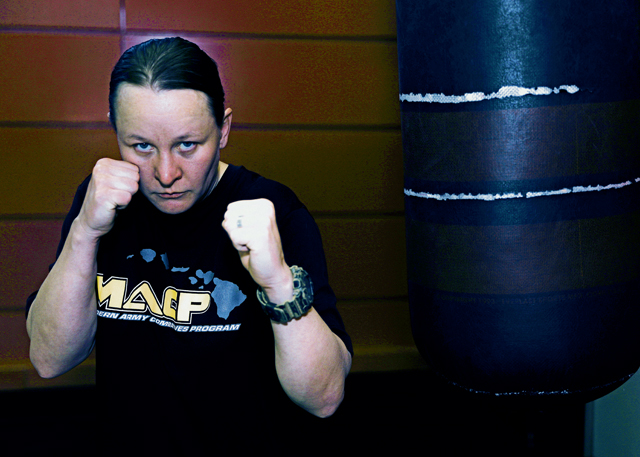
Standing in an octagon with one arm held high by a referee, the tell-tale sign of a victor, a triumphant Sarah Schneider Chance should have felt on top of the world. Instead, she felt a void.
Growing up, Schneider Chance had the typical upbringing you would expect from the only daughter in a family of five. Her two older brothers were wrestling enthusiasts, along with her father, but it never struck a chord with the Kansas City native; that is, until she turned 17.
Encouraged by her brother, Schneider Chance entered and won her first Mixed Martial Arts tournament. Prior to her first fight, Schneider Chance had only helped train family members in wrestling and boxing but had never stepped into the ring herself.
“(Fighting) was in my family,” clarifies Schneider Chance, who has been a professional fighter for the majority of her adult life. “I fought all over the world, was once a world champion, took second in the world twice. “I represented the (United States) three times (in pankration). I was the first-ever Women’s World Champion in pankration, also took two silver medals.”
Now a Sergeant in the U.S. Army, Schneider Chance says she enlisted seeking glory of another kind.
“I wanted to do something great, something honorable, something bigger than what I was doing,” states Schneider Chance.
During her second-to-last fight, Schneider Chance tore her ACL during a Judo Tournament in Germany. Following her recovery, Schneider Chance fought once more before finding her calling in the Army.
“All of a sudden I asked myself, ‘Why am I doing this?’” recalls Schneider Chance, of her decision to stop fighting.
According to Schneider Chance, now a nutrition care specialist at Landstuhl Regional Medical Center’s Nutrition Care Division, the decision was actually easier than expected. With a family history of serving in the military, she felt it was a way to be part of something bigger than the world of MMA had to offer.
“(The Army is) just a bigger scale, like a way bigger scale,” said Schneider Chance. “As a fighter, you have a team, you have teammates. In the military, you have comrades and it’s a good bond and connection, you’re able to fight and train together.”
Although Schneider Chance states she doesn’t plan to fight professionally again, the Army’s Modern Army Combatives Program has piqued her interest.
“Army Combatives definitely helps represent the Warriors ethos. As a fighter, you acquire courage to go out there and finish the fight and not turn and run from your opponents,” said Schneider Chance. “What I find similar (between professional MMA fighting and MACP) is the mentorship, fighting and your team. You all train to get really, really good and to go out there and do your best.”
Outside the ring, Schneider Chance says team work and mentorship still play a role in a successful Army unit. While characteristics of the combat sport and actual combat may differ, Schneider Chance believes the principles of teamwork in the sport parallel the Army Values, particularly loyalty, duty and courage.
“If you want a promotion, all your teammates help you get that promotion. You’re all working together to make sure that you are all as strong as you can possibly be as a team,” said Schneider Chance.
Although group MACP has been suspended at LRMC due to the COVID-19 pandemic, Schneider Chance hopes to bring it back when allowed, help others train and promote physical readiness.
“As Soldiers, (fighters) are what we are. We’re meant to fight and go win wars,” said Schneider Chance, a second-degree black belt in American Jujitsu and fourth-degree black belt in pankration. “For someone to get out there and conquer that fear (of fighting), it’s a good way to give someone something.”


